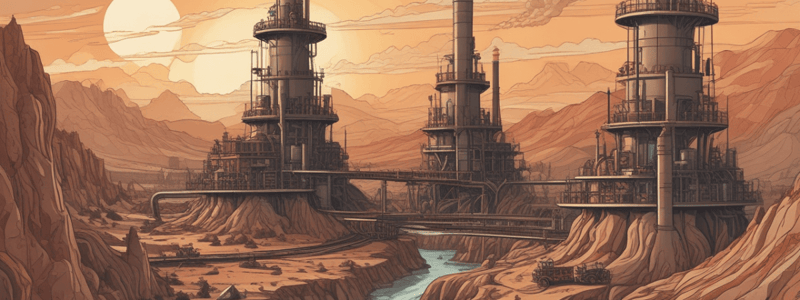Podcast
Questions and Answers
What is the process that transforms organic content into fossil fuels?
What is the process that transforms organic content into fossil fuels?
- Exploration and drilling by geologists and engineers
- Weathering and erosion
- Generation of hydrocarbons through geological processes (correct)
- Geologic time and sedimentation
What is the purpose of exploring source rocks and reservoir rocks?
What is the purpose of exploring source rocks and reservoir rocks?
- To extract fossil fuels directly
- To analyze the chemical composition of the rocks
- To study the geological history of the area
- To identify potential sites for oil and gas reserves (correct)
Why are oil and gas reserves considered nonrenewable resources?
Why are oil and gas reserves considered nonrenewable resources?
- Because they are expensive to extract
- Because they are found in limited quantities
- Because they cannot be replaced naturally (correct)
- Because they are only available in specific regions
What is the purpose of reserve estimates in oil-producing countries and companies?
What is the purpose of reserve estimates in oil-producing countries and companies?
What is the outcome of the growing Earth population on energy demand?
What is the outcome of the growing Earth population on energy demand?
What is the main challenge in oil and gas exploration?
What is the main challenge in oil and gas exploration?
What is the primary difference between proven and unproven reserves?
What is the primary difference between proven and unproven reserves?
What is the purpose of primary (traditional) methods in oil extraction?
What is the purpose of primary (traditional) methods in oil extraction?
Who is credited with starting the oil industry in the United States of America?
Who is credited with starting the oil industry in the United States of America?
What are the two types of reserves that explored and calculated reserves are translated into?
What are the two types of reserves that explored and calculated reserves are translated into?
What is the primary objective of secondary hydrocarbon recovery methods?
What is the primary objective of secondary hydrocarbon recovery methods?
What is the purpose of injecting pressured fluids in hydraulic fracturing?
What is the purpose of injecting pressured fluids in hydraulic fracturing?
What is the significance of 3D seismic technology in oil and gas exploration?
What is the significance of 3D seismic technology in oil and gas exploration?
What was the initial purpose of Edwin Drake's oil discovery?
What was the initial purpose of Edwin Drake's oil discovery?
What is one of the common uses of natural gas?
What is one of the common uses of natural gas?
Flashcards are hidden until you start studying
Study Notes
Oil and Natural Gas Reserves
- Oil and natural gas reserves are commercially recoverable fossil fuels that are formed from the remains of dead organisms over millions of years through geological processes.
- These reserves are trapped in deep subsurface rocks and can extend over large areas, requiring an integrated team of geologists and engineers to explore and extract them.
Exploration and Development
- Geologists specialize in different branches of geology, such as stratigraphy, sedimentology, structural geology, seismology, and petroleum geology, to explore source rocks and reservoir rocks.
- Hydrocarbons are extracted after finding them, designing and drilling wells, and refining and processing the extracted resources.
- Reserve estimates are calculated using technologically advanced instruments and computer software, taking into account accessibility and producibility.
Types of Oil Reserves
- Proven reserves have a 90% probability of extraction, subdivided into proven developed and proven undeveloped.
- Unproven reserves have significant uncertainties due to political and administrative issues, subdivided into probable and possible.
Technology in Oil and Natural Gas Extraction
- Fossil fuel resources are extracted through primary (traditional) and secondary methods.
- Traditional methods involve vertical drilling and pumping, with oil flowing up through the wellbore due to pressure in the reservoir.
- Secondary methods, such as water flooding, CO2 injection, steam flooding, polymer flooding, and hydraulic fracturing, are used to increase oil viscosity or movability.
History of Oil Industry
- Native Americans discovered oil in America by gathering from oil seepages and using them for medicine production.
- Edwin Drake drilled the first intentional oil well on August 27, 1859, in Titusville, Pennsylvania, starting the oil industry in the United States.
Uses of Oil and Natural Gas
- Oil and natural gas are used in:
- Transportation (gasoline, diesel fuel, jet fuel, etc.)
- Heating and industrial developments
- Petrochemical and manufacturing industries
- Food industry
- Electric generation
Studying That Suits You
Use AI to generate personalized quizzes and flashcards to suit your learning preferences.



